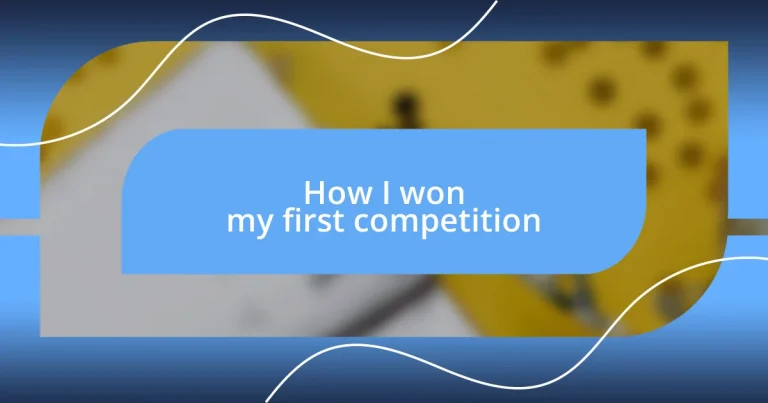Key takeaways:
- Setting clear and realistic competition goals empowers competitors, focusing efforts on tangible achievements and building confidence.
- Effective preparation involves structured training, mental visualization, and a supportive network that enhances performance on competition day.
- Learning from feedback and celebrating achievements fosters continuous growth and motivates competitors to set new goals for future challenges.
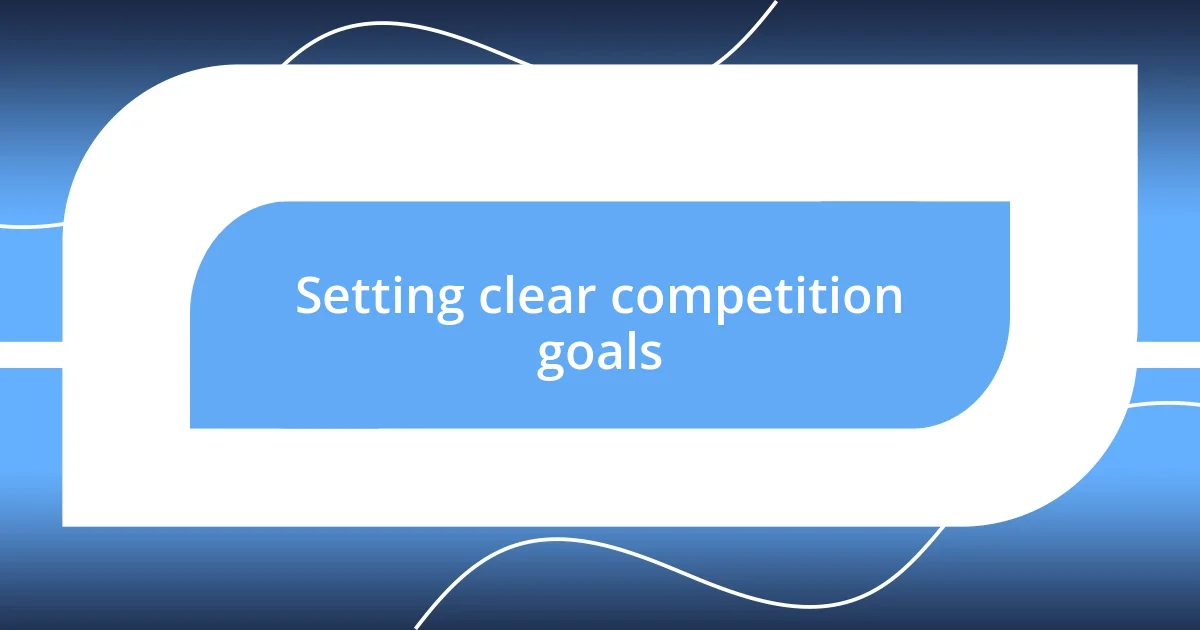
Setting clear competition goals
Setting clear competition goals is a game changer. I remember the first time I stepped into a competition arena; I felt a rush of excitement mixed with fear. I had a vague idea of what I wanted to achieve, but it was only when I defined specific benchmarks—like improving my timing by at least five seconds—that I truly felt empowered. Have you ever noticed how focusing on tangible goals helps you stay motivated?
When I think about the emotional weight of competition, clear goals can serve as a comforting anchor in times of uncertainty. During my first event, I found solace in a simple mantra: “Focus on the process, not just the end result.” This mantra guided me through the ups and downs, keeping my anxiety at bay and helping me concentrate on what mattered most.
It’s crucial to set realistic yet challenging goals. I’ve seen many competitors shoot for the stars without grounding their ambitions, leading to feelings of disappointment. What if, instead, you broke your ultimate goal into manageable steps? For instance, aiming to refine a specific skill each week can build your confidence and pave the way for success in the long run.
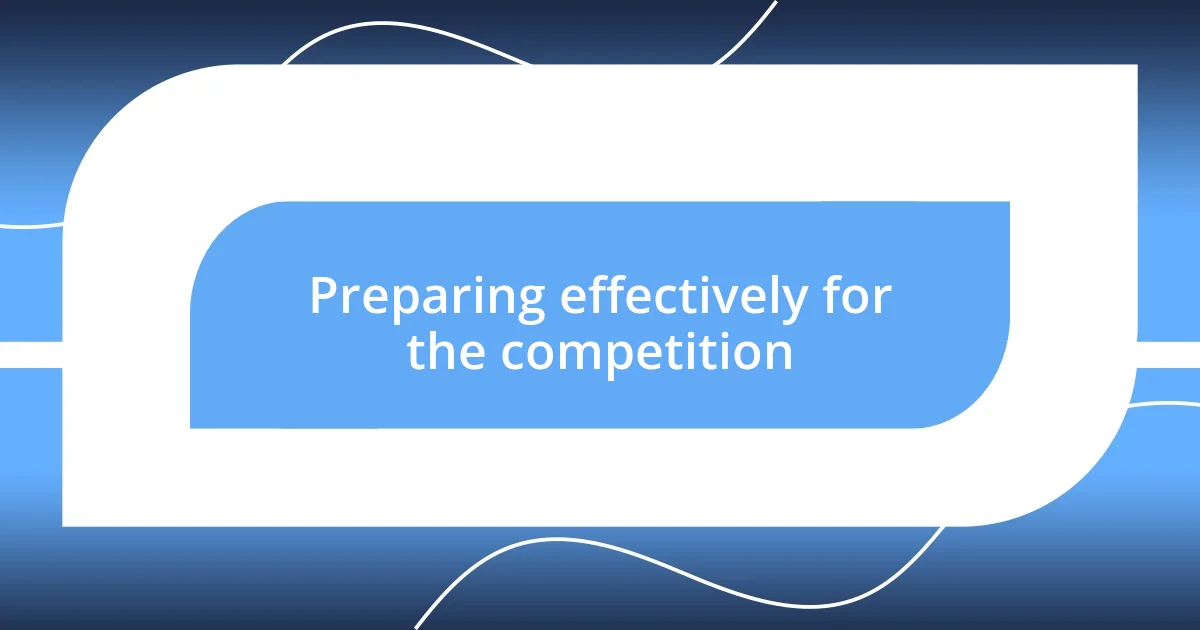
Preparing effectively for the competition
Preparing effectively for a competition goes beyond just showing up on the event day. I learned early on that creating a structured training schedule is essential. For instance, I prioritized certain skills each week leading up to my first competition. This focused approach allowed me to track my progress and adjust my practice routines when needed.
In addition to a training schedule, I found that visualizing success played a significant role in my preparation. I often took quiet moments to picture myself succeeding, hearing the crowd’s cheers, and even replaying my routine in my mind. This mental rehearsal not only built my confidence but also made those competitive moments feel familiar when they finally arrived. Has visualization ever worked for you?
Finally, I can’t stress enough the importance of bringing a support system along for the journey. During my first competition, I had friends and mentors cheering me on. Their encouragement lifted my spirits on those nerve-wracking days, reminding me that I was not alone in this endeavor. The right support makes a world of difference in both preparation and performance.
| Preparation Technique | Example from My Experience |
|---|---|
| Structured Training Schedule | Focused on specific skills weekly |
| Mental Visualization | Imagined success before events |
| Support System | Friends and mentors cheering me on |
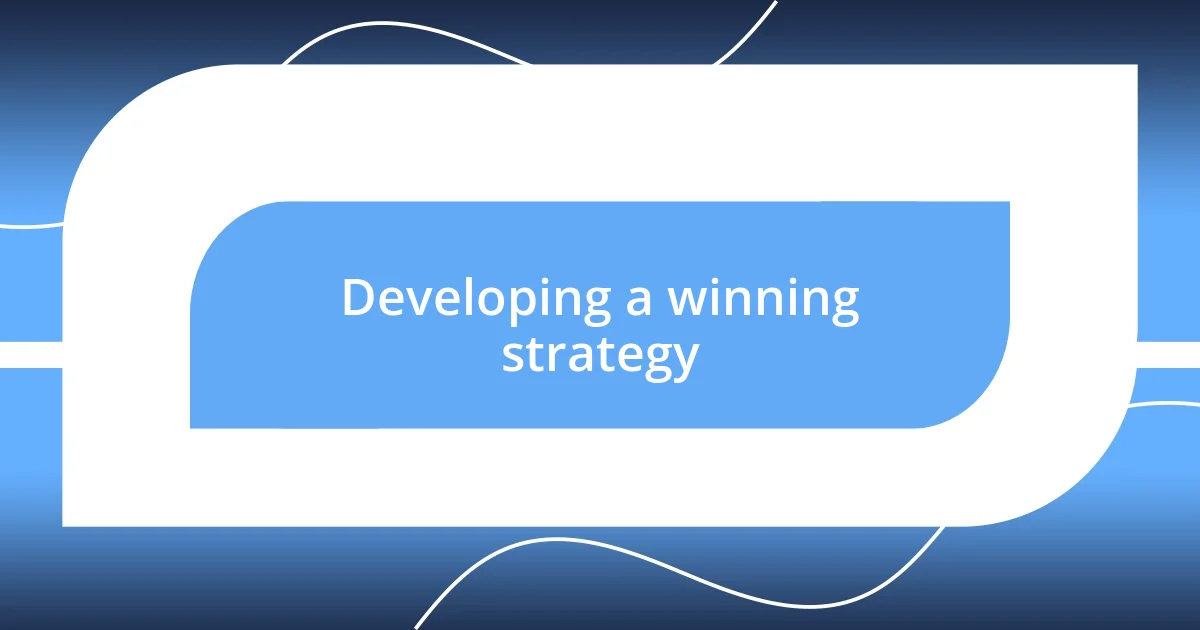
Developing a winning strategy
Developing a winning strategy is about more than just skill; it’s a holistic approach to competition. I recall sitting down with a journal before my first event, brainstorming what tactics would allow me to perform at my best. It felt daunting, but writing things out helped me identify not just my strengths, but also the areas I needed to improve. Have you ever just laid everything out, and suddenly it all clicks into place?
When I think about strategy, it’s essential to consider your opponents, too. Understanding their strengths and weaknesses can be incredibly advantageous. For example, during my competition, I noticed a rival consistently struggled with one particular skill—so I decided to optimize my own performance in that same area as a counter-strategy. This led me to adjust my routine, which ultimately helped in securing my win.
- Analyze your competition: Take note of what they excel at and where they falter.
- Reflect on your unique strengths: Identify what sets you apart and how to leverage it.
- Adjust your routine accordingly: Be flexible and willing to change your strategy based on your insights.
- Practice under various conditions: Simulate competition scenarios to refine your adaptability.
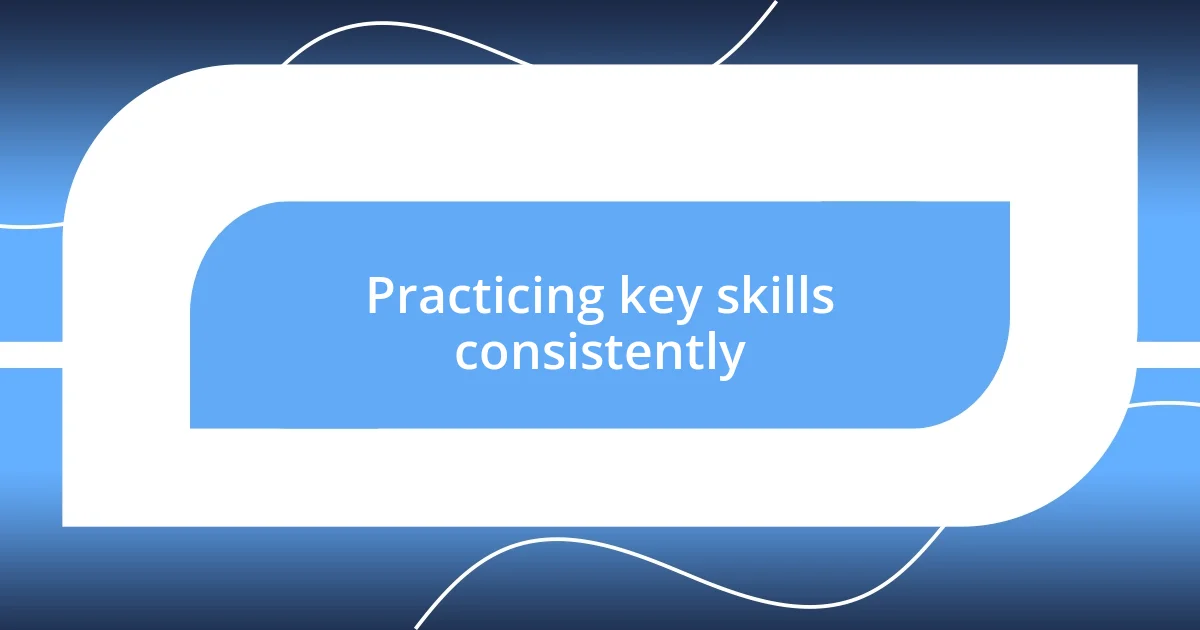
Practicing key skills consistently
Consistent practice of key skills was crucial for my success. I vividly remember those early mornings when I would hit the gym well before sunrise. The rhythmic repetition of each move not only built my muscle memory but also planted seeds of confidence. Have you ever felt that thrill of mastering a skill after countless attempts? There’s something incredibly empowering about realizing that dedication pays off.
As I progressed, I began to break down each skill into smaller components. One particularly challenging skill took me weeks to perfect, but focusing on the fundamentals made a huge difference. It was frustrating at times, yet I learned that persistence outweighs temporary setbacks. I often reminded myself that every small step counts. It’s like building a puzzle; even if one piece doesn’t fit at first, you learn how to approach it differently until it finally does.
During my preparation, I also experimented with different practice techniques. I discovered that incorporating drills with a partner added an unexpected layer of dynamism. This interactive practice not only made training feel less isolating but also allowed me to receive immediate feedback. Have you thought about how collaboration could elevate your own practice? Hearing another perspective can often shine a light on areas for improvement that we might overlook.
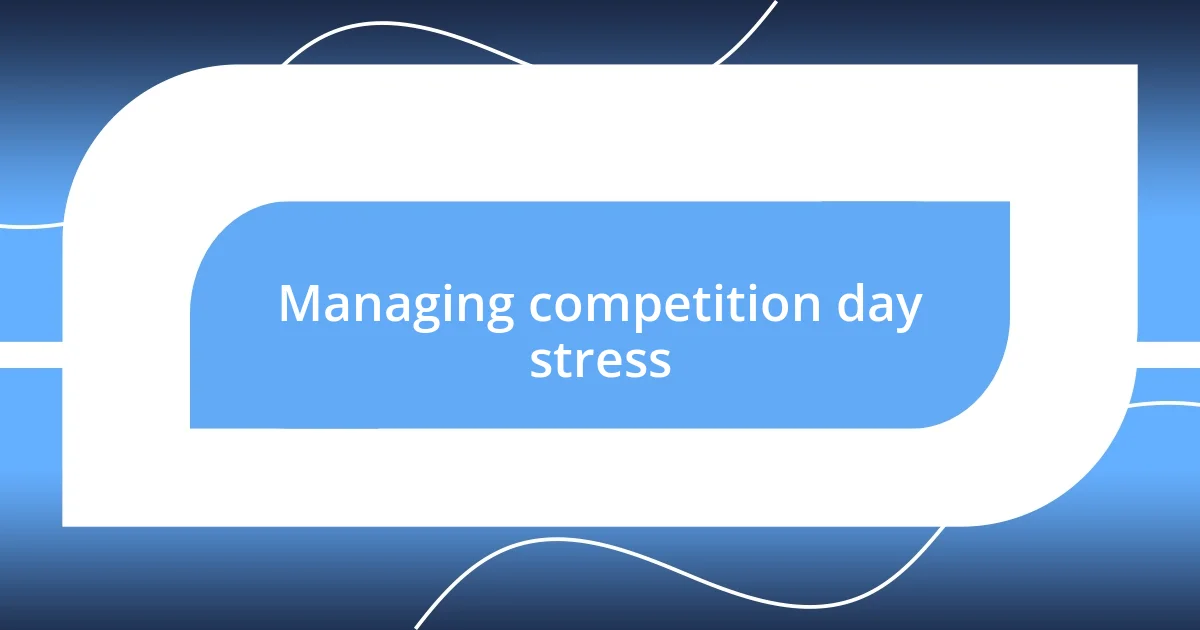
Managing competition day stress
On competition day, I found that managing stress is about preparation, both mentally and physically. I always set aside a few minutes for deep breathing exercises before my event. This simple technique not only calmed my nerves but also centered my focus. Have you ever noticed how just taking a moment to breathe can dramatically change your mindset?
Setting realistic expectations also played a pivotal role. I used to think that I had to perform perfectly, but I learned that my best effort was enough. By acknowledging that there would be ups and downs, I could focus on enjoying the experience rather than fearing failure. When I shifted my perspective, it felt liberating. How do you handle the pressure of wanting to excel while still recognizing your humanity?
Lastly, a supportive network made a world of difference. My friends and family were my cheerleaders, constantly reminding me of my hard work and training. Their encouraging words helped drown out the noise of my worries. It’s essential to surround yourself with positivity on competition day. Have you considered who supports you on your journey? Sharing the day with people who lift you up adds an extra layer of strength when the stress begins to build.
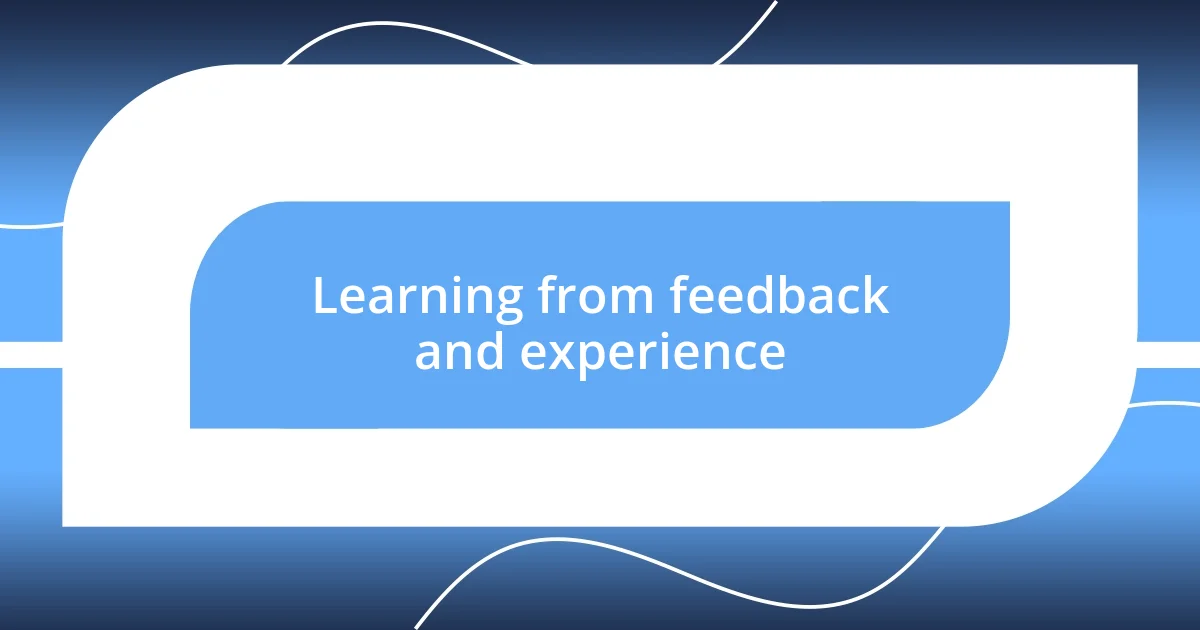
Learning from feedback and experience
Reflecting on feedback transformed my approach toward improvement. After my competition, I remember sitting down with my coach, who was both encouraging and honest. He emphasized my strengths but also pointed out areas I hadn’t considered. Have you ever received feedback that made you see yourself differently? That conversation made me realize that constructive criticism isn’t a setback—it’s a catalyst for growth.
I also started keeping a journal to track my experiences and lessons learned. Writing down my thoughts after each practice session helped me digest the feedback I received. I found clarity in my reflections, discovering patterns in my mistakes and triumphs. This process not only solidified my learning but also created a roadmap for future endeavors. How often do you take time to reflect on your experiences? I believe it’s an invaluable practice that can yield profound insights.
Every competition became a learning experience, shaping me into a more resilient competitor. I remember experiencing a setback during one event, feeling disheartened by my performance. But instead of wallowing in disappointment, I embraced it as a chance to learn. I analyzed what went wrong and approached my next competition with a renewed mindset. What lessons can failures teach us? For me, they became stepping stones rather than obstacles, leading me closer to my goals.
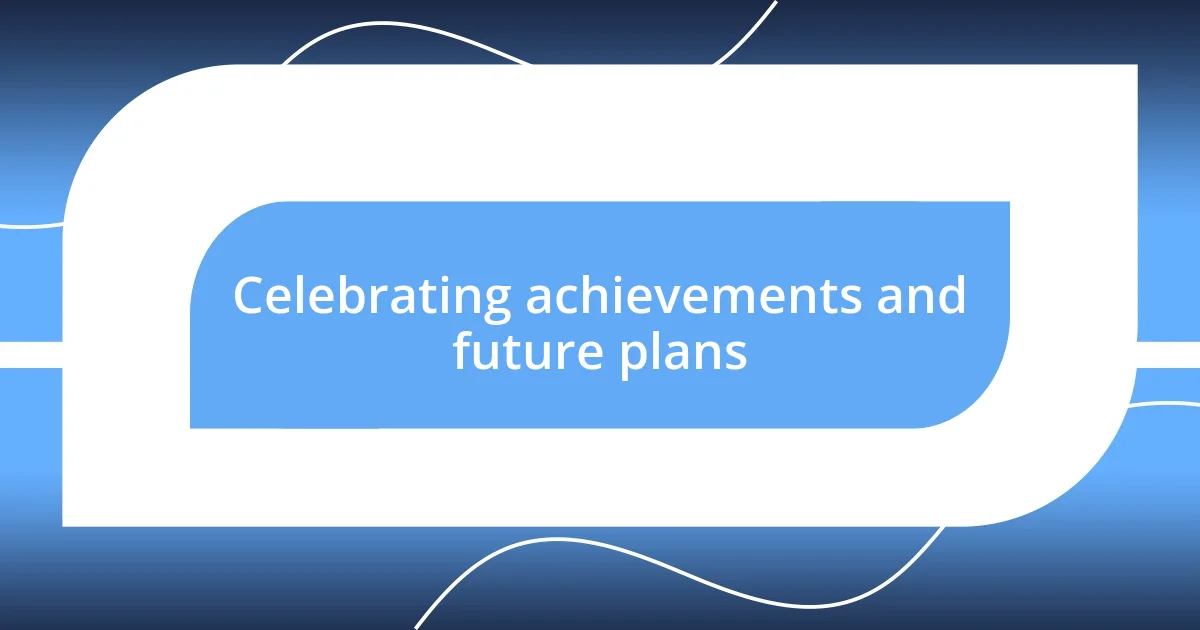
Celebrating achievements and future plans
Celebrating each achievement has a way of fueling future ambitions. I remember finishing my first competition and feeling a rush of joy that I hadn’t anticipated. It was more than just winning; it was the realization that my hard work was paying off. How often do we stop to celebrate even the small victories? Every cheer from my loved ones became a reminder of what I could achieve when I put my heart into something.
Looking ahead, I’m excited to set new goals and challenge myself even further. After that victory, it became clear that this journey was about continuous growth. I’ve started planning for upcoming events, brainstorming ways to elevate my skills. Isn’t it thrilling to think of what lies in store? The blend of anticipation and determination fuels my motivation. Sharing my goals with my mentor has also added a layer of accountability—having someone in my corner pushes me to strive harder.
Each time I reflect on my achievements, I’m reminded of the journey ahead. The exhilaration of reaching a goal makes me eager to tackle new challenges and explore uncharted territories. Do you have dreams waiting to be chased? For me, every step forward feels like building a bridge to my aspirations—each brick laid with passion and perseverance.












